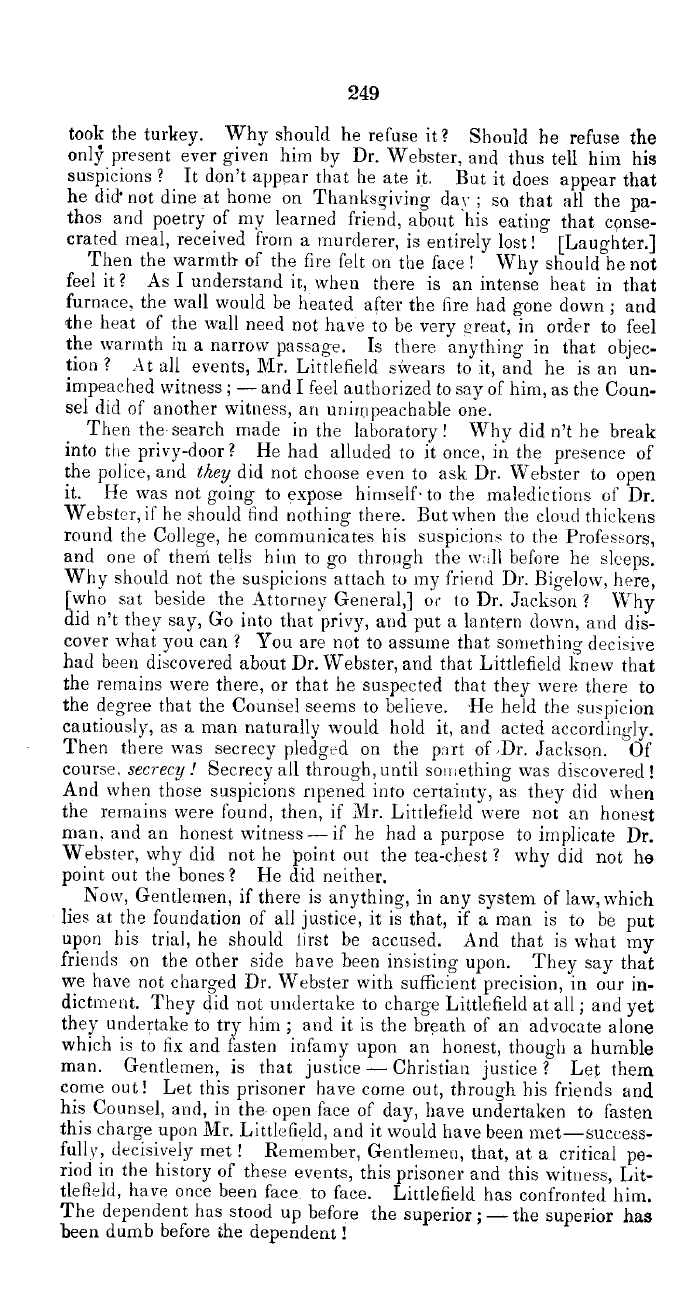|
249
took the turkey. Why should he refuse it? Should he refuse the
only present ever given him by Dr. Webster, and thus tell him his
suspicions ? It don't appear that he ate it. But it does appear that
he did' not dine at home on Thanksgiving dar ; so that all the pa-
thos and poetry of my learned friend, about his eating that conse-
crated meal, received from a murderer, is entirely lost! [Laughter.]
Then the warmth- of the fire felt on the face ! Why should he not
feel it? As I understand it, when there is an intense heat in that
furnace, the wall would be heated after the fire had gone down ; and
the heat of the wall need not have to be very -areat, in order to feel
the warmth in a narrow passage. Is there anything in that objec-
tion ? At all events, Mr. Littlefield swears to it, and he is an un-
impeached witness; -and I feel authorized to say of him, as the Coun-
sel did of another witness, an unimpeachable one.
Then the-search made in the laboratory! Why did n't be break
into the privy-door? He had alluded to it once, in the presence of
the police, and they did not choose even to ask Dr. Webster to open
it. He was not going to expose himself-to the maledictions of' Dr.
Webster, if he should find nothing there. But when the cloud thickens
round the College, he communicates his suspicion, to the Professors,
and one of them tells him to go through the wall before he sleeps.
Whv should not the suspicions attach to my friend Dr. Bigelow, here,
[who sat beside the Attorney General,] of to Dr. Jackson ? Why
did n't they say, Go into that privy, and put a lantern down, and dis-
cover what you can ? You are not to assume that something decisive
had been discovered about Dr. Webster, and that Littlefield knew that
the remains were there, or that he suspected that they were there to
the degree that the Counsel seems to believe. He held the suspicion
cautiously, as a man naturally would hold it, and acted accordingly.
Then there was secrecy pledged on the part of Dr. Jackson. Of
course. secrecy! Secrecy all through, until son;ething was discovered!
And when those suspicions ripened into certainty, as they did when
the remains were found, then, if Mr. Littlefield were not an honest
man, and an honest witness-if he had a purpose to implicate Dr.
Webster, why did not he point out the tea-chest ? why did not he
point out the bones? He did neither.
Now, Gentlemen, if there is anything, in any system of law,which
lies at the foundation of all justice, it is that, if a man is to be put
upon his trial, he should first be accused. And that is what my
friends on the other side have been insisting upon. They say that
we have not charged Dr. Webster with sufficient precision, in our in-
dictment. They did not undertake to charge Littlefield at all ; and yet
they undertake to try him ; and it is the breath of an advocate alone
which is to fix and fasten infamy upon an honest, though a humble
man. Gentlemen, is that justice - Christian justice ? Let them
come out! Let this prisoner have come out, through his friends and
his Counsel, and, in the open face of day, have undertaken to fasten
this charge upon Mr. Littlefield, and it would have been met-success-
fullv, decisively met ! Remember, Gentlemen, that, at a critical pe-
riod in the history of these events, this prisoner and this witness, Lit-
tlefield, have once been face to face. Littlefield has confronted him.
The dependent has stood up before the superior ; - the superior has
been dumb before the dependent !
|

